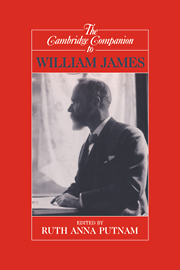Book contents
- Frontmatter
- Introduction
- 1 Pragmatism and introspective psychology
- 2 Consciousness as a pragmatist views it
- 3 John Dewey's naturalization of William James
- 4 James, Clifford, and the scientific conscience
- 5 Religious faith, intellectual responsibility, and romance
- 6 The breathtaking intimacy of the material world
- 7 James, aboutness, and his British critics
- 8 Logical principles and philosophical attitudes
- 9 James's theory of truth
- 10 The James/Royce dispute and the development of Jarnests "solution"
- 11 William James on religious experience
- 12 Interpreting the universe after a social analogy
- 13 Moral philosophy and the development of morality
- 14 Some of life's ideals
- 15 “A shelter of the mind”
- 16 The influence of William James on American culture
- 17 Pragmatism, politics, and the corridor
- 18 James and the Kantian tradition
- Bibliography
- Index
2 - Consciousness as a pragmatist views it
Published online by Cambridge University Press: 28 May 2006
- Frontmatter
- Introduction
- 1 Pragmatism and introspective psychology
- 2 Consciousness as a pragmatist views it
- 3 John Dewey's naturalization of William James
- 4 James, Clifford, and the scientific conscience
- 5 Religious faith, intellectual responsibility, and romance
- 6 The breathtaking intimacy of the material world
- 7 James, aboutness, and his British critics
- 8 Logical principles and philosophical attitudes
- 9 James's theory of truth
- 10 The James/Royce dispute and the development of Jarnests "solution"
- 11 William James on religious experience
- 12 Interpreting the universe after a social analogy
- 13 Moral philosophy and the development of morality
- 14 Some of life's ideals
- 15 “A shelter of the mind”
- 16 The influence of William James on American culture
- 17 Pragmatism, politics, and the corridor
- 18 James and the Kantian tradition
- Bibliography
- Index
Summary
INTRODUCTION
There is, of course, no one way a pragmatist must view the nature and function of human consciousness. I''ll be concerned in this essay with the way William James understood consciousness. James's struggles with the problem of consciousness provide I believe a compelling example of the pragmatic method at work, the method of trying to keep all the things we need to believe in play at once. This is no easy task since the things we need to believe typically represent the needs of different aspects of human life, of different human practices. There will be the things we need to believe for purposes of doing psychology, for living morally, for making life significant, and so on. And there is no guarantee that the things we find ourselves needing to believe will not compete. Indeed, allowing, even relishing, competition among different beliefs, the constant shifting back and forth, revising, dispelling appearances of inconsistencies, refining, and drawing together various pieces of a view of the world that works, that makes sense, as much sense as can be made from here-and-now, is what makes James such a compelling figure. His modus operandi is as visible in his work on consciousness as anywhere else in his philosophy.
- Type
- Chapter
- Information
- The Cambridge Companion to William James , pp. 25 - 48Publisher: Cambridge University PressPrint publication year: 1997
- 13
- Cited by

